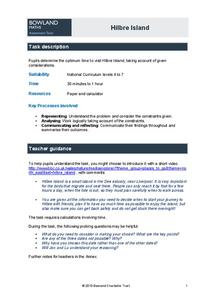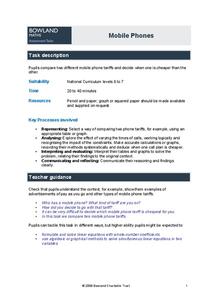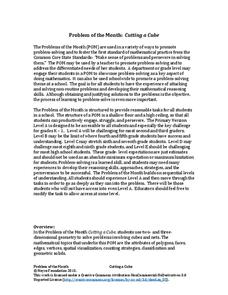Curated OER
Smart Shopping
In this exact change worksheet, 3rd graders look over a price list and circle each item that Danielle can buy with 3 quarters, 2 dimes, a nickel and a penny. Students find five groups of items that Danielle can buy together with the...
Curated OER
Sum Machine!
In this addition learning exercise, 2nd graders find the sum of 14 addition math problems involving three-digit whole numbers. Students write 1 original addition problem that can be solved.
Curated OER
Story Time
In this number sentences worksheet, 2nd graders look at 4 number sentences and tell a story about each one. Students draw a picture about each of their stories.
Curated OER
Find the Fake
In this division problems worksheet, 3rd graders look at 7 rows of division problems and determine which one of the four on each row does not belong with the other three. Students circle their answers.
Curated OER
Get Into Shape Puzzle
In this math activity, students practice the skills of spatial reasoning and shape recognition. They cut out the pieces to the puzzle and put it back together.
Curated OER
Two Squares are Equal
This problem is sure to get your young mathematicians thinking. The idea sounds simple: one equation, solve it as many ways as you can. This is meant to get at a deeper understanding of solving quadratic equations, including some more...
Arizona Department of Education
Introduction to Integers
Welcome to the backward world of negative numbers. This introductory lesson teaches young mathematicians that negative numbers are simply the opposite of positive numbers as they use number lines to plot and compare single-digit integers.
Curated OER
Explore Subtraction
Learnersare given 26 tables and graphs in which they must fill in missing numbers and graph equations. They subtract a given value of x from a constant number, and use a number line to subtract larger numbers from smaller ones resulting...
Bowland
Fruit Pies
Scholars use formulas for the area of a circle and the area of a rectangle to determine the number of pies a baker can make from a particular area of dough. They must also take into account rolling the remaining dough into a new sheet.
Curated OER
Exam One Review
In this secondary mathematics activity, students solve problems that involve patterns, arithmetic and geometric sequences, geometric logic and reasoning, and changing bases. The three page activity contains fourteen problems. Answers...
Curated OER
Moving Day
In this problem solving worksheet, 3rd graders use logic to come to a solution. Students read a short scenario and respond to 1 short answer question writing a logical solution to the given situation.
Curated OER
Not So Snappy 14
In this word problem worksheet, students endeavor to logically discover the answers to some common-sense equations. Three out of four questions pertain to real-world situations with the fourth asking for number products.
Curated OER
Lines and Spaces
In this reasoning worksheet, 1st graders complete the directions provided using reasoning skills for each. Students focus on 4 problems following the given criteria to complete each.
Curated OER
The Brain Teaser Five Pack
In this brain teaser worksheet, students find the answers to 5 word and number puzzles. They reason answers and use number skills to find the answers.
Curated OER
Pecans
In this calculator activity, learners complete a task using pecans. Students complete 4 short answer questions and a "challenge" question using reasoning skills and calculating their responses.
California Education Partners
Improving Our Schools
Split the work three ways. Learners use their knowledge of fractions to solve problems dealing with splitting up work loads evenly between three groups. Scholars determine the fractional portion of work each group will do along with...
California Education Partners
Science Fair Project
Plant the data firmly on the graph. Given information about the growth rate of plants, pupils determine the heights at specific times and graph the data. Using the information, scholars determine whether a statement is true and support...
Google
Surveys and Estimating Large Quantities
Looking for an estimation activity a bit more involved than the typical "guess the number of jellybeans in the jar" game? Here, learners use a picture to estimate the number of people at a large event, look for potential problems with...
Bowland
Magic Sum Puzzle
Learners discover the magic in mathematics as they solve numerical puzzles involving magic sums. They then make a conjecture as to why no additional examples are possible based on an analysis of the puzzles.
Bowland
Fish Dish
Minimize the time it takes to create a fish dish. Scholars use their knowledge of time to devise an order that accounts for different constraints. Considering jobs that can be done in parallel is essential to solving the problem.
Bowland
Hilbre Island
Young travelers plan a trip to Hilbre Island based on constraints on tides and time. They use a timeline to help determine the optimal day/time to make the trip.
Bowland
Mobile Phones
Cheaper cell phone bills? Learners compare two different cell phone plans for a specified number of minutes of phone usage each day. They also determine the conditions for which one plan is cheaper than the other.
Centre for Innovation in Mathematics Teaching
Ten Data Analysis Activities
This thirteen page data analysis worksheet contains a number of interesting problems regarding statistics. The activities cover the concepts of average measurements, standard deviation, box and whisker plots, quartiles, frequency...
Noyce Foundation
Cutting a Cube
Teach the ins and outs of the cube! A series of five K–12 level activities explore the make-up of the cube. The beginning lessons focus on the vocabulary related to the cube. Later lessons explore the possible nets that describe a cube....

























